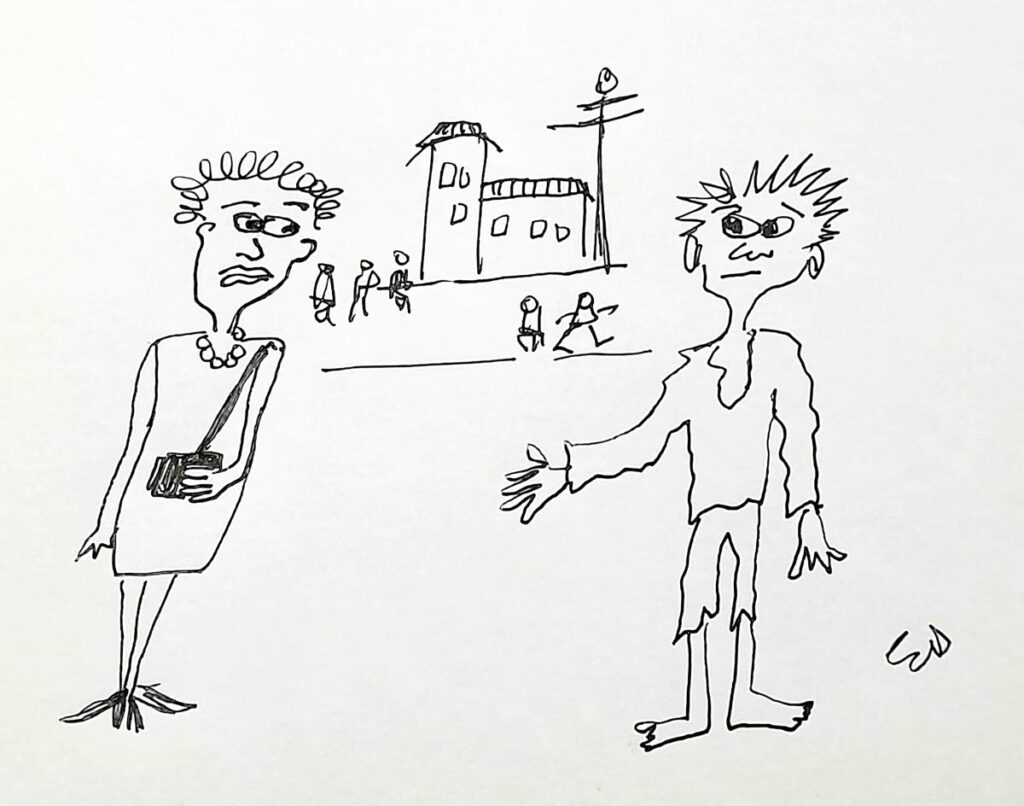We are all in need

Recently, after a man approached me asking for money, I thought – if I were to pretend to be a beggar for a day, to have an authentic experience of such a condition, I would execute it on an island on which I am not known.
To do such in TT, I would need to wear a hat or wig and get a make-up artist to change my appearance completely, making me unrecognisable even to close loved ones. Having anyone addressing me as “Elspeth!” or asking what I am doing "dressed like that," would ruin the experiment – the purpose of which is to observe how differently I would be treated (even by people who know me) if I were "a beggar" and to get a better understanding of how people who beg may feel.
Who wants to spend ages in the scorching sun or in rain, in filthy clothing (though not all "beggars" are so attired), facing ongoing rejection?
As my experience of "begging" would be experimental, I would have the privilege of determining when to return to my real life and its duties and comforts.
The experiment might not be one hundred per cent authentic but would still give interesting insights.
Aspects I could observe might include:
1. "Where do I beg and why?"
I would choose a supermarket carpark or exterior of an eating place – as some people who do not give money or may not have cash, sometimes say "I can buy you something to eat/drink."
2. "How do I feel when I am repeatedly rejected" (even though I know it is just an experiment)?
An article in Psychology Today says: "Rejection piggybacks on physical pain pathways in the brain. Functional magnetic resonance imaging (fMRI) studies show that the same areas of the brain become activated when we experience rejection as when we experience physical pain. That is why rejection hurts (neurologically speaking)." Imagine, as a "beggar," having pain pathways activated multiple times in one day... every day...
3. "Who to approach and why?"
I often notice how those who beg in the supermarket carpark seem to crane necks and tip toe, to scan the crowd and zero in on particular individuals. What does the "beggar" look for in those who are targeted as potential "givers" – a look of wealth, kindness, gullibility, accessibility or some other aspect.

In my experiment I would choose people who appear "approachable." I often sense that quality when I am on the streets interviewing people at random for articles, or out of general interest in hearing diverse perspectives.
I perceive "approachable" strangers as having an inexplicable aura about them, something that feels "open." Rarely am I wrong. Those I choose to approach generally stop and listen/respond to what I say/ask.
Their easy acceptance of me could be on account of my approach (friendly, polite), my gender (women are less often perceived as being "dangerous") and how they may judge me based on appearance.
Were I disguised as a man, fitting the stereotype of a "gangster" or "beggar," how many of those same people would easily accept and communicate with me? Once, in London, I was in a somewhat deserted area, trying to follow a small map leading to a friend’s art exhibition.
After a while I saw a man heading my way. Holding the map, I approached him and said "Excuse me please...”
“No! No! Not today!” he barked, quickening his pace and putting his hand up in a "stop" signal.
Because it was a cold, windy day – the kind that generally makes people scurry along, heads down, arms folded, I assumed that was the reason for his curt dismissal. When someone else came along and the reaction was similar, I deduced that they thought I was a migrant beggar, holding a piece of paper on which someone had written my list of needs – since, to them, the only English I must have known was "Excuse me, please..."
One of the five sutras of the Aquarian Age states: "Recognise that the other person is you."
If, as a social experiment or, even just mentally, we spent more time "exchanging places" with others less fortunate than or seemingly quite different from ourselves, we might notice that, regardless of status, we are all "in need" – even if just of greater compassion – and all have something, tangible or not, to give.


Comments
"We are all in need"